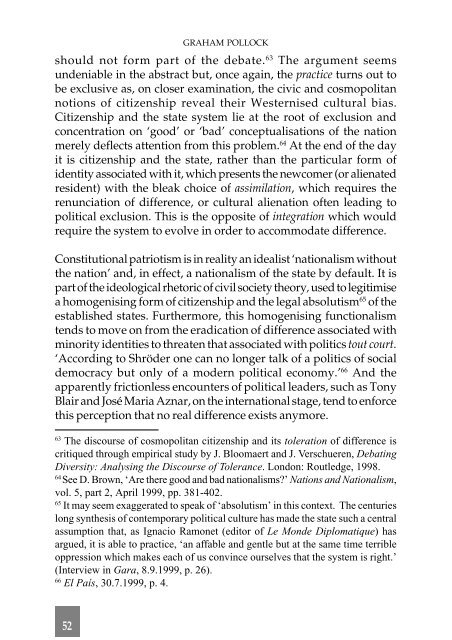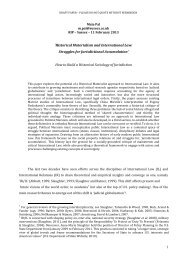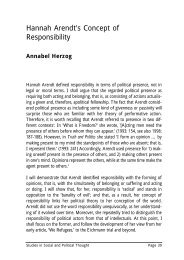Civil Society Theory and Euro-Nationalism - University of Sussex
Civil Society Theory and Euro-Nationalism - University of Sussex
Civil Society Theory and Euro-Nationalism - University of Sussex
Create successful ePaper yourself
Turn your PDF publications into a flip-book with our unique Google optimized e-Paper software.
52<br />
GRAHAM POLLOCK<br />
should not form part <strong>of</strong> the debate. 63 The argument seems<br />
undeniable in the abstract but, once again, the practice turns out to<br />
be exclusive as, on closer examination, the civic <strong>and</strong> cosmopolitan<br />
notions <strong>of</strong> citizenship reveal their Westernised cultural bias.<br />
Citizenship <strong>and</strong> the state system lie at the root <strong>of</strong> exclusion <strong>and</strong><br />
concentration on ‘good’ or ‘bad’ conceptualisations <strong>of</strong> the nation<br />
merely deflects attention from this problem. 64 At the end <strong>of</strong> the day<br />
it is citizenship <strong>and</strong> the state, rather than the particular form <strong>of</strong><br />
identity associated with it, which presents the newcomer (or alienated<br />
resident) with the bleak choice <strong>of</strong> assimilation, which requires the<br />
renunciation <strong>of</strong> difference, or cultural alienation <strong>of</strong>ten leading to<br />
political exclusion. This is the opposite <strong>of</strong> integration which would<br />
require the system to evolve in order to accommodate difference.<br />
Constitutional patriotism is in reality an idealist ‘nationalism without<br />
the nation’ <strong>and</strong>, in effect, a nationalism <strong>of</strong> the state by default. It is<br />
part <strong>of</strong> the ideological rhetoric <strong>of</strong> civil society theory, used to legitimise<br />
a homogenising form <strong>of</strong> citizenship <strong>and</strong> the legal absolutism 65 <strong>of</strong> the<br />
established states. Furthermore, this homogenising functionalism<br />
tends to move on from the eradication <strong>of</strong> difference associated with<br />
minority identities to threaten that associated with politics tout court.<br />
‘According to Shröder one can no longer talk <strong>of</strong> a politics <strong>of</strong> social<br />
democracy but only <strong>of</strong> a modern political economy.’ 66 And the<br />
apparently frictionless encounters <strong>of</strong> political leaders, such as Tony<br />
Blair <strong>and</strong> José Maria Aznar, on the international stage, tend to enforce<br />
this perception that no real difference exists anymore.<br />
63 The discourse <strong>of</strong> cosmopolitan citizenship <strong>and</strong> its toleration <strong>of</strong> difference is<br />
critiqued through empirical study by J. Bloomaert <strong>and</strong> J. Verschueren, Debating<br />
Diversity: Analysing the Discourse <strong>of</strong> Tolerance. London: Routledge, 1998.<br />
64 See D. Brown, ‘Are there good <strong>and</strong> bad nationalisms?’ Nations <strong>and</strong> <strong>Nationalism</strong>,<br />
vol. 5, part 2, April 1999, pp. 381-402.<br />
65 It may seem exaggerated to speak <strong>of</strong> ‘absolutism’ in this context. The centuries<br />
long synthesis <strong>of</strong> contemporary political culture has made the state such a central<br />
assumption that, as Ignacio Ramonet (editor <strong>of</strong> Le Monde Diplomatique) has<br />
argued, it is able to practice, ‘an affable <strong>and</strong> gentle but at the same time terrible<br />
oppression which makes each <strong>of</strong> us convince ourselves that the system is right.’<br />
(Interview in Gara, 8.9.1999, p. 26).<br />
66 El País, 30.7.1999, p. 4.
















